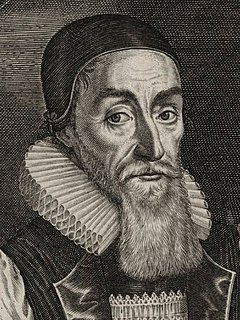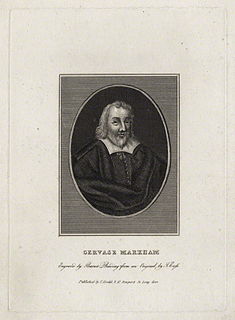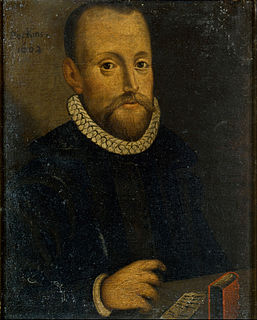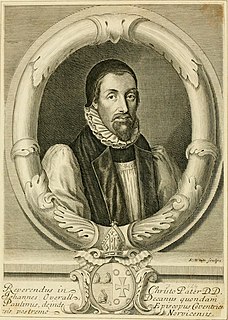
Robert Hill (died 1623) was an English clergyman, a conforming Puritan according to Anthony Milton. [1]

Robert Hill (died 1623) was an English clergyman, a conforming Puritan according to Anthony Milton. [1]
He was a native of Ashbourne, Derbyshire. He was educated at Christ's College, Cambridge, and graduated B.A. in 1584, M.A. in 1586. [2] In 1588-9 he was admitted fellow of St. John's College, Cambridge, and from about 1591 to 1602 was perpetual curate of St Andrew's Church, Norwich. He found Norwich full of preaching, and attributed this in part to the mayor, Francis Rugge. [3]
Hill took an active part in the disputed election to the mastership of St. John's in 1595. By October 1601 he was chaplain to Lord Chief Justice John Popham. Having commenced B.D. in 1595, he was incorporated at Oxford on 10 July 1605. In 1602 he became lecturer of St. Martin-in-the-Fields in London, and on 15 September 1607 rector of St. Margaret Moyses, Friday Street. In 1609 he proceeded D. D. On 24 February 1613 he was preferred by Lord Chancellor Ellesmere to the well-endowed rectory of St. Bartholomew Exchange, and resigned his other cure.
Hill died in August 1623, and was buried by his desire near his first wife in the chancel of St. Bartholemew. He married, first, between 1613 and 1615, Margaret, daughter of John(?) Witts of Ghent, and widow of Adrian de Saravia, who died in childbed on 29 June 1615, aged 39. Her death was mourned by Joshua Sylvester. Hill's second wife, Susan, apparently the sister of Thomas Westfield, survived him.
Hill was author of:
Hill translated from the Latin of William Bucanus Institvtions of Christian Religion, London, 1606, and edited William Perkins's Godly Exposition upon the three first chapters of the Revelation, London, 1607. In the fourth part of the Workes of Richard Greenham London, 1612, is An Exposition of the 119 Psalme found unperfect and perfected by R. Hill. He also collected the posthumous sermons and lectures of Samuel Hieron, and published them in 1620 as the second volume of Hieron's works. Hill has Latin verses before Foulk Robartes's The Revenue of the Gospel in Tythes, 1613.

Joseph Hall was an English bishop, satirist and moralist. His contemporaries knew him as a devotional writer, and a high-profile controversialist of the early 1640s. In church politics, he tended in fact to a middle way.

Thomas Campion was an English composer, poet, and physician. He was born in London, educated at Cambridge, studied law in Gray's inn. He wrote over a hundred lute songs, masques for dancing, and an authoritative technical treatise on music.

Tokugawa Hidetada was the second shōgun of the Tokugawa dynasty, who ruled from 1605 until his abdication in 1623. He was the third son of Tokugawa Ieyasu, the first shōgun of the Tokugawa shogunate.

GervaseMarkham was an English poet and writer. He was best known for his work The English Huswife, Containing the Inward and Outward Virtues Which Ought to Be in a Complete Woman, first published in London in 1615.

William Perkins (1558–1602) was an influential English cleric and Cambridge theologian, receiving both a B.A. and M.A. from the university in 1581 and 1584 respectively, and also one of the foremost leaders of the Puritan movement in the Church of England during the Elizabethan era. Although not entirely accepting of the Church of England's ecclesiastical practices, Perkins conformed to many of the policies and procedures imposed by the Elizabethan Settlement. He did remain, however, sympathetic to the non-conformist puritans and even faced disciplinary action for his support.
Sir Robert Killigrew (1580–1633) was an English courtier and politician who sat in the House of Commons at various times between 1601 and 1629. He served as Ambassador to the United Provinces.
Thomas Fitzherbert was an English Jesuit.
Randal mac Sorley MacDonnell, 1st Earl of Antrim, PC (Ire), rebelled together with Tyrone and Tyrconnell in the Nine Years' War but having succeeded his brother James as lord of the Route and the Glynns in 1601, he submitted to Mountjoy, the Lord Deputy of Ireland, in 1602. In 1618 he became Viscount Dunluce and in 1620 was advanced to Earl of Antrim. However, he remained Catholic.

John Overall (1559–1619) was the 38th bishop of the see of Norwich from 1618 until his death one year later. He had previously served as Bishop of Coventry and Lichfield, as Dean of St Paul's Cathedral from 1601, as Master of Catharine Hall from 1598, and as Regius Professor of Divinity at Cambridge University from 1596. He also served on the Court of High Commission and as a Translator of the King James Version of the Bible.

Sir Henry Hobart, 1st Baronet, of Blickling Hall, was an English politician who succeeded Sir Edward Coke to become Chief Justice of the Court of Common Pleas.
Roger Fenton (1565–1615) was an English clergyman, one of the translators of the Authorised King James Version.
John Towers was an English churchman, Bishop of Peterborough from 1639, a royalist and a supporter of the ecclesiastical policies of William Laud.
Robert Boyd, 7th Lord Boyd (1595–1628), was a Scottish noble.
Sir Thomas Lowe was an English politician who sat in the House of Commons at various times between 1606 and 1622. He was an alderman of the City of London and became Lord Mayor of London in 1604.
Count Simon VII of Lippe was a ruler of the Reformed county of Lippe-Detmold.
Sir Arthur Hopton, of Witham, Somerset, was an English politician. He was member of parliament for Dunwich in 1571, and for Suffolk in 1589. He was made a Knight of the Bath at the coronation of King James I.